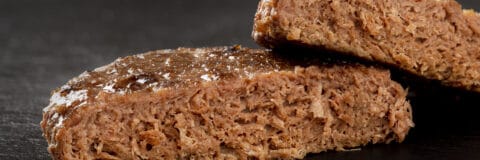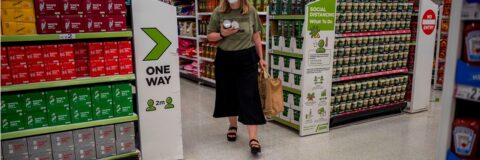
In a landmark ruling for the US pet care market, the authority responsible for animal food safety has, for the first time, authorised commercialisation of an ingredient derived from insect protein for use in dog nutrition.
The Association of American Feed Control Officials (AAFCO) has granted Ÿnsect the first authorisation for the commercialisation of defatted mealworm proteins (Protein70) in the United States.
As a substitute for some commonly used animal derivatives, mealworm proteins can significantly contribute to reducing the environmental footprint of pet food.
With the total value of the US market for pet food and treats projected to have reached a staggering $62.7bn in 2023, this groundbreaking authorisation opens up strong prospects for Ÿnsect and its Sprÿng brand.
Approval by AAFCO is a very big deal, commercially, says Shankar Krishnamoorthy, CEO of Ÿnsect:
“It is the recognition of over 10 years of research for the benefit of animal health and opens the doors to the immense American market, just as we are preparing to deliver our first pet food customers from our Amiens farm.”
Six-month trial of safety and nutritional benefits
As part of its application for authorisation in the US, Ÿnsect submitted a comprehensive scientific dossier, including evidence from a six-month trial introducing mealworm-derived ingredients into the diet of dogs.
Conducted in collaboration with pet-food testing experts at Summit Ridge Farms, this pioneering long-term study demonstrated not only the safety of the product, but also the nutritional benefits of defatted mealworm flour. Based on Tenebrio molitor (mealworm beetle), the flour features a high content of proteins rich in essential amino acids, plus the presence of unsaturated fatty acids, fibres, vitamins, and minerals.
The research evidenced the safety of a diet containing up to 30% mealworm proteins. It also demonstrated a very high level of protein digestibility, exceeding 80%, in line with the recommendations of industry professionals at both AAFCO and FEDIAF, which is the voice of the European pet food industry.
Additionally, Ÿnsect collaborated with Professor Kelly Swanson from the Animal Sciences Laboratory at the University of Illinois Urbana-Champaign to study its defatted mealworm flour from Tenebrio molitor.
The university study showed that the quality of protein in the flour was comparable to that of high-grade animal products traditionally used in pet food manufacturing, such as beef, pork, and salmon.
This level of quality is superior to any offered by standard poultry meal and common plant proteins.
Growth market ripe for alternative proteins
Americans appear particularly devoted to their pets.
According to the American Veterinary Medical Association (AVMA), nearly 4 out of 10 American households have a dog (48%), totalling over 65 million dogs across the United States.
In 2022, the actual US market for pet products was valued at approximately $136bn, according to the American Pet Products Association (APPA), with $58.1 billion dedicated solely to sales of food and treats.
The US is therefore ripe for innovation, adds Philippe Pichol, SVP Chief Sales & Marketing Officer at Ÿnsect:
“American pet owners are very attentive to the wellbeing of their pets, including providing appropriate nutrition. Our discussions with key players in the market led us to anticipate significant development in alternative meat proteins.”
Most pets are carnivores and require a protein-rich diet.
As a result, the pet food industry has been engaged in research and innovation for several years in a bid to reduce the environmental impact of pet diets, gradually incorporating alternative proteins.
While Tenebrio molitor flour, Protein70, from the Sprÿng brand has demonstrated its nutritional benefits, it can also help reduce the environmental footprint of pet food by replacing other protein sources.
As mealworms are raised from agricultural by-products in cereal-producing regions, their environmental footprint is lower than that of many other traditionally used ingredients. For example, 1kg of Sprÿng Protein70 flour emits half as much CO2 equivalent as lamb or soy flour, and 22 times less than beef flour.
Production in climate-positive vertical farms
Ÿnsect is a global leader in the production of insect-based proteins and natural fertilisers.
Founded in 2011 in Paris, France, by scientists and environmental activists, the Next40 member and B Corp-certified company transforms insects into high-value premium ingredients for pets, plants, and humans.
The aim is to provide a more ecological, healthy, and sustainable solution to meet the growing demand for protein and plant consumption. So, using pioneering proprietary technology protected by over 430 patents, Ÿnsect produces mealworms in climate-positive vertical farms that benefit biodiversity, aligning with the +1.5°C scenario of the COP21 Paris Agreement and the EU’s Fit for 55 goal.
Ÿnsect operates several production sites including the world’s largest vertical farm. Exporting worldwide, the company has raised over $625M from major global investment funds, banks, and public institutions.
Further Reading:
- More about Ÿnsect and its pet food brand Sprÿng;
- More about the Association of American Feed Control Officials (AAFCO);
- Also on SustMeme, Pilot plant for sustainable protein from microbes;
- Also on SustMeme, Are pea, canola and oat the future for plant protein?
- Also on SustMeme, How sustainable is controlled environment agriculture?
- Also on SustMeme, Divestment: Are meat and plastic the new coal?
Check out the full archive of stories on the SustMeme Business & Finance Channel, now available to Sponsor.




